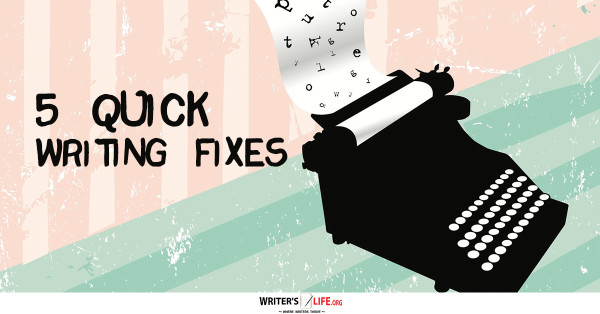- How To Tackle Jealousy In Creative Writing
- Common Submission Mistakes
- How To Stop Your Blog Becoming Boring
- The One Thing Every Successful Writer Has In Common
- How To Make Yourself Aware Of Publishing Scams
- Why Almost ALL Writers Make These Grammar Mistakes At Some Point
- 5 Tips For Authors On How To Deal With Rejection
- Top Mistakes to Avoid When Writing a Novel
- How to Avoid Common New Writer Mistakes
- 10 Mistakes New Fiction Writers Make
5 Quick Writing Fixes

All writers know that finishing a piece of work is one thing, editing it is quite another, and often when we get to the end of a piece of writing and try to begin editing, the whole process can feel a little overwhelming. You want to tighten up your prose, weed out any errors, and check for inconsistencies, but where do you start?
However, there is always a danger of compromising your writing style or losing your writing voice, as well as getting so bogged down in editing that the work becomes almost unrecognisable, and ends up worse than when you started!
However, editing is something that every writer must do. Wordiness, typos, plot inconsistencies and the dreaded ‘telling’ rather than ‘ showing’ all creep into our stories and articles however experienced and brilliant we may be.
Unfortunately, there is no magic wand that we can use to wave over our writing and make it perfect. However, there are some quick and simple fixes that you can try to improve your work.
So why not give the following a go?
Recognise the words you overuse
We all have our favourite words and phrases that seem to crop up time and time again in our work. If you can recognise yours, then it is super easy to do a search (ctrl/ cmd + f) to find them and change them to something else. You can also search for words such as ‘like’ ‘really’ ‘very’ and ‘just’ which writers tend to drop into their work unnecessarily, and get rid of these too!
Look out for the passive voice
If you have ever used a writing aid such as Grammarly, you’ll know that using the passive voice is an absolute no-no. Sentences tend to be much stronger when written in an active voice. If you can look out for these and change them, your writing will be all the better for it!
Eliminate wordiness
It is so easy to overwrite parts of your story or article in your first draft. Every writer does it, and this happens particularly frequently when you are struggling to write but want to reach your aim of 1,000 words (or whatever goal you have set for yourself that day). Beautiful descriptions are great but instead of using three words - find the perfect one and just use that instead.
Check your dialogue
If you have lots of dialogue in your text, it is important to make sure the reader knows who is saying what.
At the same time, there is nothing more annoying than reading the words ‘he said,’ ‘she said,’ at the end of every piece of dialogue. If it is evident who is doing the talking, trust that your reader will know this and get rid of the narrative tags.
Check for inconsistencies
It can be so easy to get muddled when it comes to dates, times of year, weather, characters ages and so on.
Look out for where you have mentioned these things and check you are consistent throughout i.e. if it’s the summer, make sure it isn’t snowing (unless it’s specifically pointed out that it’s snowing in summer!).
Readers are wily creatures, they’ll notice when you do things like this, so make sure you’ve thoroughly checked everything before you set your writing free into the world.
These five quick writing fixes will help you tighten up your prose, eliminate any unwanted and unnecessary words and phrases and will make sure your story makes sense!
So next time you sit down to edit your work, why not give these a try and see how much your writing improves?


























